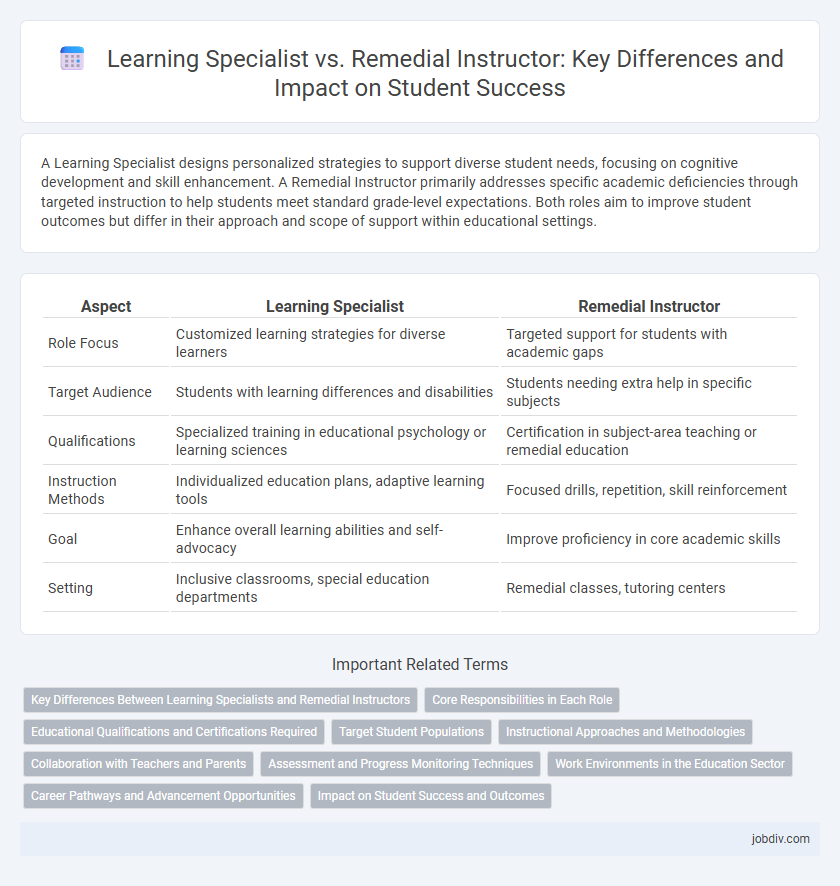A Learning Specialist designs personalized strategies to support diverse student needs, focusing on cognitive development and skill enhancement. A Remedial Instructor primarily addresses specific academic deficiencies through targeted instruction to help students meet standard grade-level expectations. Both roles aim to improve student outcomes but differ in their approach and scope of support within educational settings.
Table of Comparison
| Aspect | Learning Specialist | Remedial Instructor |
|---|---|---|
| Role Focus | Customized learning strategies for diverse learners | Targeted support for students with academic gaps |
| Target Audience | Students with learning differences and disabilities | Students needing extra help in specific subjects |
| Qualifications | Specialized training in educational psychology or learning sciences | Certification in subject-area teaching or remedial education |
| Instruction Methods | Individualized education plans, adaptive learning tools | Focused drills, repetition, skill reinforcement |
| Goal | Enhance overall learning abilities and self-advocacy | Improve proficiency in core academic skills |
| Setting | Inclusive classrooms, special education departments | Remedial classes, tutoring centers |
Key Differences Between Learning Specialists and Remedial Instructors
Learning Specialists design personalized learning strategies focused on individual student strengths to enhance overall academic performance, whereas Remedial Instructors concentrate on reinforcing fundamental skills in core subjects like reading and math for students struggling to meet grade-level standards. Learning Specialists employ diagnostic assessments to identify unique learning challenges and implement accommodations, while Remedial Instructors use targeted intervention techniques to bridge specific knowledge gaps. The primary distinction lies in the scope: Learning Specialists support diverse learning needs across various content areas, whereas Remedial Instructors focus primarily on remediation of foundational skills.
Core Responsibilities in Each Role
Learning Specialists design personalized instructional strategies to support diverse learners and enhance academic performance through assessment and intervention plans. Remedial Instructors focus on addressing specific skill deficits by providing targeted instruction in foundational subjects such as reading, math, and writing to help students meet grade-level standards. Both roles emphasize improving student outcomes, but Learning Specialists apply broader educational assessments while Remedial Instructors deliver focused remedial teaching.
Educational Qualifications and Certifications Required
Learning Specialists typically hold advanced degrees in education, psychology, or specialized fields such as special education, often requiring certifications like Licensed Specialist in School Psychology (LSSP) or Certified Academic Language Therapist (CALT). Remedial Instructors generally possess a bachelor's degree in education or related fields and may hold state-specific teaching licenses, with additional endorsements in remedial or intervention instruction. Both roles demand ongoing professional development, but Learning Specialists focus more on diagnostic assessments and individualized learning plans, while Remedial Instructors emphasize direct skill remediation.
Target Student Populations
Learning Specialists primarily support students with learning differences, disabilities, or exceptional needs by customizing instructional strategies to enhance academic success. Remedial Instructors target students who struggle with grade-level skills, offering focused intervention to bridge gaps in subjects like reading, math, and writing. Both roles aim to improve student performance, but Learning Specialists emphasize individualized accommodations while Remedial Instructors provide skill-specific reinforcement.
Instructional Approaches and Methodologies
Learning Specialists employ data-driven instructional approaches tailored to diverse learning needs, integrating evidence-based strategies such as differentiated instruction and Universal Design for Learning (UDL). Remedial Instructors focus primarily on targeted skill reinforcement using repetitive practice and scaffolding techniques to address specific academic deficits. Both roles emphasize personalized support, but Learning Specialists often incorporate a broader range of methodologies including assistive technology and metacognitive strategies.
Collaboration with Teachers and Parents
Learning Specialists collaborate closely with teachers to design personalized instructional strategies that address individual student needs, while also maintaining regular communication with parents to ensure consistent support and progress monitoring. Remedial Instructors work directly with students to reinforce foundational skills, frequently coordinating with classroom teachers to align interventions but typically engaging less extensively with parents. Effective collaboration among Learning Specialists, Remedial Instructors, teachers, and parents fosters a cohesive educational environment that supports student achievement and addresses learning gaps comprehensively.
Assessment and Progress Monitoring Techniques
Learning Specialists utilize comprehensive assessment tools such as formative assessments, diagnostic evaluations, and progress monitoring software to tailor individualized learning plans that address diverse student needs. Remedial Instructors primarily focus on targeted skill-based assessments and frequent benchmark tests to identify specific academic deficiencies and track improvement in foundational areas like reading or math. Both roles employ data-driven progress monitoring but differ in scope, with Learning Specialists emphasizing broad cognitive development and Remedial Instructors concentrating on alleviating particular learning gaps.
Work Environments in the Education Sector
Learning specialists typically work in inclusive educational settings such as public and private schools, collaborating closely with general education teachers and specialists to support diverse learners. Remedial instructors often operate in more targeted environments like resource rooms, tutoring centers, or after-school programs focused on skill-specific interventions. Both roles require adapting instructional strategies to meet individual student needs, but learning specialists engage more broadly with curriculum development and assessment integration.
Career Pathways and Advancement Opportunities
Learning Specialists typically pursue advanced certifications in educational psychology or special education, leading to roles such as curriculum developers or instructional coordinators, offering broader career advancement. Remedial Instructors often focus on skill-specific tutoring with pathways toward becoming certified teachers or intervention specialists, concentrating on direct student support roles. Career growth for Learning Specialists is generally linked to strategic educational planning and administration, while Remedial Instructors advance through classroom expertise and specialized teaching credentials.
Impact on Student Success and Outcomes
Learning specialists utilize evidence-based strategies tailored to diverse learning needs, fostering improved academic achievement and long-term skill development. Remedial instructors primarily address specific skill deficits through targeted interventions, contributing to immediate improvement in foundational subjects. Both roles significantly enhance student success, but learning specialists often drive more holistic and sustainable educational outcomes.
Learning Specialist vs Remedial Instructor Infographic

 jobdiv.com
jobdiv.com